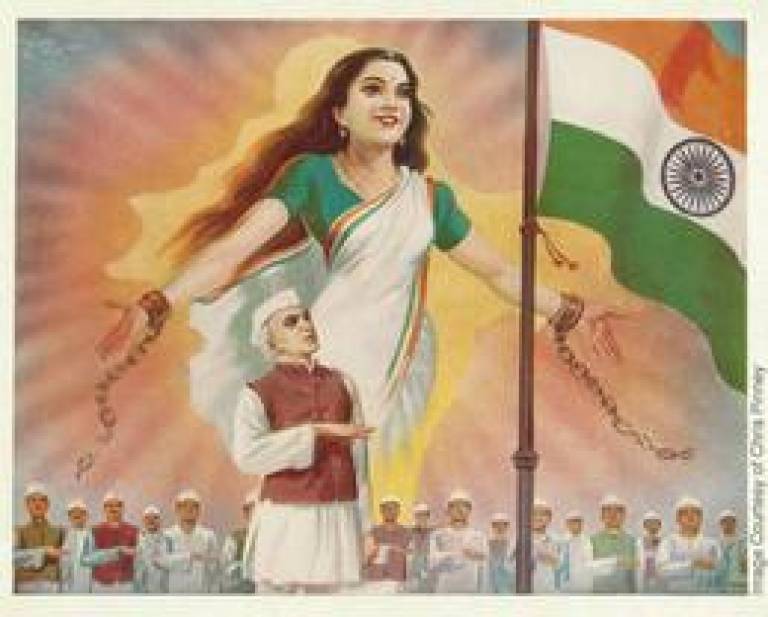INDIA: A VENERATION NATION?
23 April 2012

Department of Anthropology, University College London
Tuesday, 12 June 2012, from 10:00 to 17:30
Conference Schedule
Conference Abstracts
Conference Poster
Co-organisers:
Urmila Mohan, UCL Anthropology u.mohan.11@ucl.ac.uk
Jill Reese, UCL Anthropology jill.reese.09@ucl.ac.uk
Please email either of the co-organisers if you wish to attend. This
event is free and open to the public but registration is required.
This one-day conference critically examines India through the lens of a
"Veneration Nation"-a country with thriving and recursive cultures of
adulatory practices and aesthetics. By looking at contemporary
ethnographies on India that invoke ideas of ritual,
spectacle, prayer, and affectivity we hope to interrogate and extend
the application of analytic categories of 'religion', 'politics' and
'embodiment'. The conference will be accompanied by an ethnographic
exhibition from private collections, a film screening
and a web publication. In the interests of highlighting new and
emerging work on this subject, the speakers will include post-fieldwork
PhD students and postdoctoral researchers as well as established
academics such as the renowned Sumathi Ramaswamy, Professor
of History and Director of the Duke Center for South Asian Studies, who
will provide the Keynote Address.
WHY VENERATION?
The Oxford English Dictionary defines veneration as "a feeling of deep
respect and reverence directed towards some person or thing." Common
assumptions of the term 'veneration' simplify it as reverence for a
religious deity or object, or gloss it as a synonym
of 'devotion' or 'idolisation'. The etymology of the word 'venerate' is
from the Latin venerātus and venerārī, "to reverence, worship,
venerate", and from venus and veneris, "love, sexual desire, loveliness,
attractiveness, beauty, charm", which is cognate
with Sanskrit vānati, "(he) loves, attains". This etymology indicates a
connection between corporeality, emotions and efficacy that we wish to
explore and critique in the context of India. We suggest that our
efforts are part of the study of emotive, affective
and sensational forms and their visual and material incorporation in
religion and politics.
In unpacking the term, we find both theoretical and methodological
utility in accessing, interrogating and mobilising 'veneration' in its
diverse forms and practices within religious contexts and beyond, as it
works upon multiple forms of logic including the
linguistic and discursive, spatio-temporal and visual, somatic and
material. These include its ability to bind not only devotee and deity,
but also communities as a whole as a process of mediation in the
assembling (or 'reassembling') of communities or nations.
While veneration may imply a hierarchical relationship between
supplicant and the venerated, it is not always a mono-directional
transaction. In both religious and political contexts, veneration is a
practice that binds devotee/citizen and deity/leader in
a relationship of reciprocity and obligation.
We propose that veneration can be mobilised in a range of contexts and
that the reasons that make the intimacy of religio-political and somatic
domains in India possible are worth researching through the efficacious
uses of images and materials. We will explore
this against a backdrop of the implications of 'Hinduism', the
contemporary relevance of Indic terms, ethno-sociological models,
colonialism and indigenous modernity. While these discussions may focus
on India we argue that their significance extends to wider
issues like the relevance of analytical categories in anthropology and
the emergence of concepts like Indian 'dividuals' that have been
comparatively applied elsewhere in the world.
ABSTRACTS: We seek innovative proposals from post-fieldwork PhD
students, postdoctoral researchers and other early career PhDs from a
range of disciplines including, but not limited to, material and visual
culture, religion, history, architecture, politics,
archaeology, digital technologies, and performance studies.
Please contact the organisers or visit
www.venerationnation.co.uk for additional information, updates and conference registration.
*Funded by the UCL Anthropology Research & Reading Group Fund.
 Close
Close

